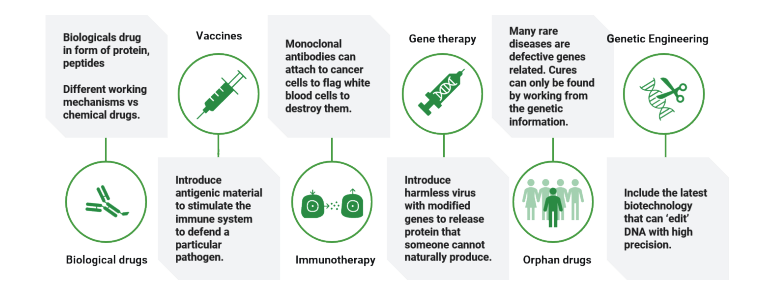Investing in the vaccines of tomorrow: the case for biotechnology
Technology may typically be thought of in terms of computers and communications but its use in the sphere of biotechnology is saving lives and changing how we treat diseases. While investing in this area has obvious appeal from a social and moral perspective, it can also be a highly lucrative space as a growth investment in a portfolio.
Healthcare and biotechnology
Biotechnology is a sub-industry of the healthcare sector, which is typically divided into two spheres:
- Pharmaceuticals, biotechnology & life sciences
- Health care equipment and services
Biotechnology specifically refers to technologies
that use biological processes, capturing companies that focus on research, development, manufacturing and/or marketing of products based on
biological and genetic information. The different
types of biotechnology include biological drugs,
vaccines, immunotherapy, gene therapy, orphan
drugs and genetic engineering.

While it may sound like a newer industry, biotechnology has a long rich history – the creation of
penicillin is in fact a form of biotechnology. The
continued improvements in technology over time
have also benefitted the biotechnology industry,
enhancing the ability to access and use biological
processes which we may not have even been
aware existed in the past. For example, DNA
sequencing has revolutionised our ability to diagnose certain health concerns in individuals.
Genome editing is a newer technology which may
transform how we treat or cure genetic diseases.
Demand is only likely to continue, not just on the
basis of the permanent need for treatments and
vaccines for existing and yet to be identified
diseases, but also because of the ability to
improve the way in which we treat. Imagine a
world where any illness you have can be treated
with a drug specifically designed to work with
your genes and therefore minimise negative
side-effects and reduce recovery time? This is a
future that biotechnology is working towards.
A growing industry
It is no secret that biotechnology has experienced
extraordinary growth in recent times. Even in Australia, the fact that CSL Limited toppled Commonwealth Bank and BHP this year to become the
largest company by market capitalisation is an
indication of the growing importance and value of
biotechnology (1).
Biotechnology is predicted to be valued at more
than US$729bn by 2025, compared to US$295bn
today (2), and will continue to grow, driven by the
growing global population and the need for affordable, effective treatments and vaccines to support
treatment in the population.
Biotechnology will also be a beneficiary of population ageing, particularly in Western countries. The
reason for this is that an increase in the volume of
older citizens is likely to have an accompanying
and proportional increase in the volume of age-related diseases such as cardiovascular disease,
dementia or arthritis, all needing treatment (3).
Gilead is one example of a company with prospects in this space. Gilead is already well-known
for its highly effective HIV treatments but is also
targeting US and European approvals to market a drug called Filgotinib to treat rheumatoid
arthritis (4).
In a demonstration of the growth in this industry,
this year alone, 30-35 biotechnology companies
are anticipated to go public, raising approximately
US$3.5bn (5)
The COVID-19 pandemic may assist in accelerating the growth in biotechnology. Biotechnology
companies have been at the forefront in seeking
vaccines and cures for COVID-19. There are
currently 11 potential COVID-19 vaccines in clinical evaluation (that is, undergoing testing) and a
further 128 in pre-clinical evaluation (6). Moderna is
an example of a major biotechnology company
running clinical testing currently. It was the first
company to start human trials and anticipates
entering phase 3 trials with 30,000 participants by
July (7).
The healthcare sector as a whole is likely to see
greater investment as a result of the COVID-19
pandemic. For example, national health spending
growth in the US is expected to average 5.4%
annually through 2028, reaching US$6tr a year (8).
Biotechnology will also be a beneficiary of this
increased investment.
The US at the centre of biotechnology
Australian investors tend to have a concentrated
domestic exposure to biotechnology given the
dominance of players such as CSL, Cochlear or
ResMed but may be missing the growth and diversification offered overseas. The US in particular is
positioned as the global centre of biotechnology.
The US biotechnology industry is valued at
113.3bn (9), approximately 14x the size of the Australian biotechnology industry (10).
The reason for the US dominance in this field is
due in part to the world-renowned US Food & Drug
Administration (FDA) approval process and also
to the size of its customer base.
Any companies seeking access to distribute their
products in the US market need to submit to FDA
evaluation and in turn, many companies have
sought to base themselves there for easier access to the process and for easier distribution
and marketing to US consumers.
A lucrative and risky industry
Australian investors can consider the US biotechnology industry as a diversification measure,
along with exposure to a high growth segment
internationally.
Biotechnology can be a high-risk industry, with
high costs for drug development and high chances of failure. The rewards for successful trials can
also be immense.
To put this in perspective, in any given year, 54% of
clinical phase 3 trials typically fail for a range of
reasons (11), with average costs for developing a
drug estimated at more than US2.1bn (12). The trials
and approval process can take years, often 10
years or more, with less than 12% reaching
approved status with the FDA (13).
Biotech and healthcare companies then derive
revenue from approved products using patents,
which last approximately 20 years from the date
of application (but also require maintenance fees
and in some cases, can be extended) (14). This
means generic, cheaper versions from competitors cannot be sold in this period, allowing a company an effective monopoly over a particular form
of treatment in that time. Of course, once this
patent expires, competitors can enter, so companies will continue research, development and testing on a permanent basis in the hope of finding
the next major treatment they can generate
revenue from.
Another source of return for this industry is from a
high rate of merger and acquisition activity. Smaller and mid-size biotechnology companies are
often targets for larger firms, wanting to expand
with complementary capabilities they might not
previously have had. It’s a mutually beneficial relationship, providing smaller and mid-size companies with the capital they need to finance development and testing.
Mergers and acquisitions for biotechnology was
valued at US$23bn in 2019 (15). Pre-COVID-19,
activity was tipped to step up in activity for 2020,
with oncology, cardiovascular/metabolic disease, immunology, infectious disease and central
nervous system disorders anticipated to benefit (16).
Why invest in biotechnology?
Investment and value from biotechnology is expected to grow in coming years. While the trend already existed due to continuous tech improvements and the needs of a growing population, the COVID-19 pandemic has created a new spotlight on this area which may accelerate its growth.
While Australian investors are likely to already be
exposed to this growth segment in the concentrated domestic market, they may be missing
exposure to the US, which dominates the global
market for biotechnology.
Ways to invest in biotechnology
There are a range of ways to access the biotechnology industry. Investors could consider direct shares in biotechnology companies or alternatively consider managed funds. Direct shares can be a high-risk approach due to the high failure rates of drug testing and long periods of development (i.e., long periods where there may be no or a limited return on investment). There’s also the element of chance – has the investor picked the winner? It could take years to know.
Managed investments, be it an actively managed fund or passive options like ETFs, can assist in managing the risks by spreading it across a larger number of companies. Investors could choose to invest by taking a sector approach and investing in a fund focusing on broader healthcare, or look at industry-specific options focusing on biotechnology. ETFS S&P Biotech ETF (ASX:CURE) is one such example that offers broad exposure to US biotechnology.
Efficient access to US biotechnology
ETFS S&P Biotech ETF (ASX:CURE), offers investors exposure to US biotechnology companies engaged in research, development, manufacturing and/or marketing of products based on genetic analysis and genetic engineering.
For more information on investing in biotechnology please hit the 'CONTACT' button below.
Footnotes
- (VIEW LINK)
-
https://www.gminsights.com/industry-analysis/biotechnology-market
- (VIEW LINK)
-
https://www.fiercebiotech.com/biotech/gilead-builds-case-for-filgotinib-active-psoriatic-arthritis
- State Street, 2020
- (VIEW LINK)
- (VIEW LINK)
-
https://www.healthleadersmedia.com/finance/national-health-spending-growth-projected-54-annually-through-2028
-
https://www.ibisworld.com/industry-statistics/market-size/biotechnology-united-states/
- (VIEW LINK)
- https://www.ncbi.nlm.nih.gov/pmc/articles/PMC6092479/)
- Deloitte Centre for Health Solutions, Unlocking R&D Productivity, 2018.
- (VIEW LINK)
- (VIEW LINK)
-
https://assets.ey.com/content/dam/ey-sites/ey-com/en_gl/topics/life-sciences/life-sciences-pdfs/ey-firepower-report-2020-how-will-deals-done-now-deliver-what-the-health-ecosystem-needs-next-v2.pdf
-
https://assets.ey.com/content/dam/ey-sites/ey-com/en_gl/topics/life-sciences/life-sciences-pdfs/ey-firepower-report-2020-how-will-deals-done-now-deliver-what-the-health-ecosystem-needs-next-v2.pdf
1 topic
4 stocks mentioned

